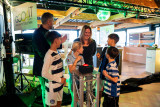instagrid - we are a start-up with new technology for the world's most advanced battery-driven portable power supply. Our products can replace mobile diesel generators, that are still largely used on construction sites, reducing local emissions to zero and improving the air quality in the city. We would like Amsterdam to be one of the pioneering cities to test and implement this new technology.
Want to receive updates like this in your inbox?
Get notified about new updates, opportunities or events that match your interests.
Maybe you will also like these updates
Lezing generatieve AI en deepfakes (Dutch)

Kun je nog weten wat betrouwbaar is in tijden van generatieve AI en deepfakes?
Deze Nederlandstalige lezing is bedoeld voor iedereen die meer wil weten over de risico’s van deepfakes (denk aan stemklonen, plaatjes en chatgpt).
Wat is de globale werking, waar kom je het tegen, wanneer moet je extra voorzichtig zijn en wat kun je doen om jezelf te beschermen en manipulaties te doorzien.
How can we, as citizens, designers, and policymakers, regain control over the technologies that shape our cities?

Join us for the workshop: Civic Sousveillance & Democratic Oversight of Sensor Technology.
In this interactive workshop, we explore democratic oversight of camera detection and other urban sensors: from citizen initiatives such as the On Camera pocket guide and smart city camera-spotting tours to current policies on data collection in public space.
With contributions by Tom van Arman & Mike de Kreek from the Human Values for Smarter Cities research project, Inge Janse & Arthur De Jaeger from Centre for BOLD Cities, and council member Elisabeth IJmker from GroenLinks-PvdA. Next to talks we will also go outside for a joint camera-spotting tour around Arcam.
Date: Thursday, January 29, 2026
Time: 4:00 p.m. – 6:00 p.m.
Location: Arcam
Address: Prins Hendrikkade 600
Language: Dutch
Registration: free, but mandatory via the registration form which is here
More info on the Human Values for Smarter Cities research project is here
Amsterdam and Haarlem launch groundbreaking sustainable artificial turf pitch innovations

The pioneering innovations were presented of the Scale Up Future-proof artificial turf pitches project, a collaboration between Amsterdam and Haarlem focused on sustainable artificial turf pitches. Over the next few years, more than 250 sports pitches in both cities will be transformed into circular, energy-generating and climate-adaptive sports venues. These artificial turf pitches can not only generate and store energy, but also involve smart water management. An approach that is globally relevant for urban sports infrastructure.
Three consortia collaborate on the sport pitch of the future
The three selected consortia Antea Sport, EnergieVeld and GOO4iT together comprise more than 15 market players. They join forces within this innovation partnership, where there is room for long-term collaboration, co-creation and scalable innovation. The pioneering solutions will make it possible to cool down sport pitches on warm days, help dispose of and collect rainwater, make the pitches more pleasant for the users and possibly even generate energy for the surrounding area. Find out how these innovations are shaping the sport pitch of the future here.
Two municipalities: joint procurement
The Scale Up Future-proof artificial turf pitches project is a unique collaboration between two municipalities and market players. The municipalities jointly procure pooling their purchasing power and use an innovation partnership to challenge the market to test and scale up innovative and sustainable solutions. In doing so, the solutions are also scalable and transferable to other cities in the Netherlands and Europe.
From prototype to pilot fields
The first prototype fields will be constructed in Amsterdam and Haarlem in 2026, in different capacities and combining multiple innovations, where they will be extensively tested and monitored for a year. Successful concepts are then scaled up to full-scale pilot pitches and tested and monitored for another year. This will form the basis for the new standard of sustainable sports pitches, with potential for adoption in other cities around the world. At the same time, existing pitches are already being improved with the most sustainable solutions available, making an immediate impact from the start. The project thus shows how cooperation between municipalities and market players can lead to innovative, climate-proof sports infrastructure with international relevance.
Join us
This project provides cities worldwide a blueprint for sustainable, smart, and future-proof artificial turf pitches. Interested municipalities and industry partners can get in touch and subscribe to our news updates by sending an e-mail to: sportveldvandetoekomst@amsterdam.nl.

